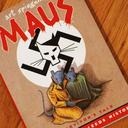Welcome, reader! Did you enjoy Maus? Let us know what your thoughts are. If you're not sure what to say, have a go at a few of the questions below: - What is Speigelman's purpose in writing Maus? Is he motivated by history? By art? By family obligation? By ambition?
- What does Spiegelman benefit from using the graphic form to accomplish that goal? Where do you see evidence of this in the book? Where and why does it succeed? Where and why does it fail?
- What makes this form particularly successful or unsuccessful at telling a holocaust narrative? How does it compare to famous holocaust narratives produced in other forms, such as the film Schindler's List or The Diary of Anne Frank?
- Do the animals used to represent different nations -- French frogs, Jewish mice, German cats, Polish Pigs, American Dogs, Swedish stags -- work metaphorically? What is the effect of that visual simplification?
- To what degree is Vladek's survival based on luck versus skill, character or other merit? What message does this send?
- Spiegelman tells us that Vladek’s second wife Mala was a survivor too, like most of his parents’ friends. Why does Spiegelman call Mala a survivor? What does it mean to be a survivor?
- What kind of relationship does Spiegelman have with Vladek? Is it healthy? Why or why not? Could a relationship like this improve as time goes on? Why
- Vladek embodies miserly tendencies and other negative Jewish stereotypes that make Spiegelman uncomfortable. Why does he have these traits? Why doesn't Spiegelman edit them out?
- Why does Anja kill herself? Particularly, why does she do so after surviving the camps?
- Why is the suicide section of the book so different visually? How do you interpret the details of those differences? (The hands, the black trim, the use of actual human figures and a photograph.)
|

 RSS Feed
RSS Feed